Guy Watson & Jane Baxter Everyday & Sunday recipes from
Riverford Farm  Contents When Guy Watson began growing vegetables organically on his familys farm in South Devon, it was the beginning of Riverford Organic. They are now one of the countrys largest independent organic growers and pioneering veg box suppliers, regularly garnering critical acclaim for their delivery service and Field Kitchen restaurant. Riverfords awards include the Soil Associations Best Organic Retailer 2009, the Observer Ethical Awards Best Business 2009 and Best Online Retailer 2010, and the Observer Food Monthly s Best Ethical Restaurant 2009 and 2010. Month by month, Everyday & Sunday describes what vegetables are in season and the best ways to use them, with recipes for quick, everyday meals alongside one or two for a more celebratory dish, or an indulgent Sunday feast. From a warming kale gratin in March, to a fresh salad of braised Little Gems and mint in June or a Swiss chard, squash and blue cheese torte in October, Jane Baxters simple and inspiring recipes will help you to make the best of your veg, all year round.
Contents When Guy Watson began growing vegetables organically on his familys farm in South Devon, it was the beginning of Riverford Organic. They are now one of the countrys largest independent organic growers and pioneering veg box suppliers, regularly garnering critical acclaim for their delivery service and Field Kitchen restaurant. Riverfords awards include the Soil Associations Best Organic Retailer 2009, the Observer Ethical Awards Best Business 2009 and Best Online Retailer 2010, and the Observer Food Monthly s Best Ethical Restaurant 2009 and 2010. Month by month, Everyday & Sunday describes what vegetables are in season and the best ways to use them, with recipes for quick, everyday meals alongside one or two for a more celebratory dish, or an indulgent Sunday feast. From a warming kale gratin in March, to a fresh salad of braised Little Gems and mint in June or a Swiss chard, squash and blue cheese torte in October, Jane Baxters simple and inspiring recipes will help you to make the best of your veg, all year round. 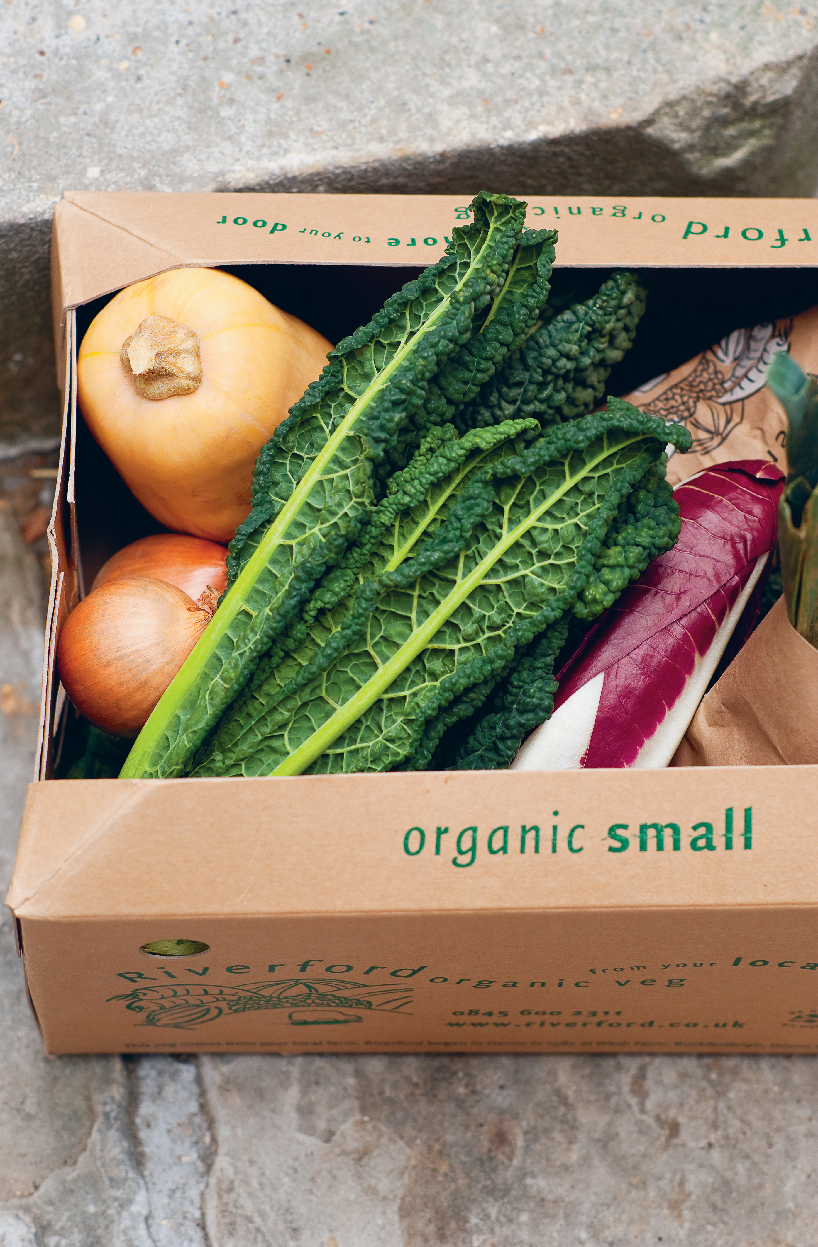
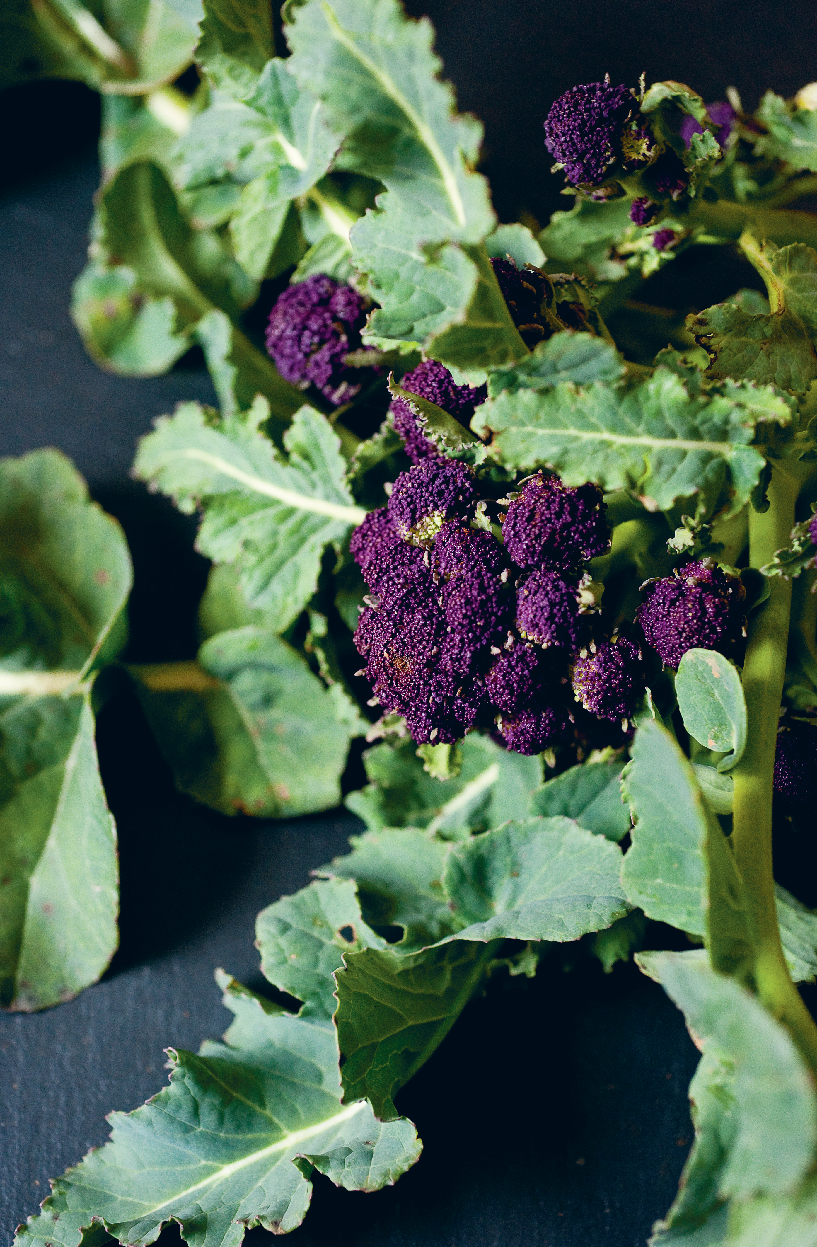 When, after years of exponential growth, sales of our vegetable boxes quite suddenly plateaued in early 2007, it took a while to figure out why.
When, after years of exponential growth, sales of our vegetable boxes quite suddenly plateaued in early 2007, it took a while to figure out why.
Customers, and even ex-customers, still seemed to like us and our vegetables but, when asked in a customer survey how easy life is with a veg box only 5 per cent replied really easy. Almost two-thirds found it fairly easy (read a bit difficult), while a full third found it a struggle. A struggle might be relished when doing a crossword or climbing Ben Nevis, but these are matters of choice. Feeding the family is obligatory; its part of our busy, routine, everyday lives and we want it to be straightforward. Sixty years of steadily growing advertising budgets have incessantly pushed processed food as a convenient alternative, insidiously suggesting that only a Neanderthal or a fool would peel a potato or pod a bean. Thankfully, some held out, working away in isolated kitchens cooking what was then deeply unfashionable: food made from scratch, using local and seasonal ingredients.
Their rebellion is spreading, and has even become fashionable. Many now aspire to cook seasonal food from scratch but, after two generations of passive surrender to the food industry, few have the confidence and skill to make it easy. Despite the hype from celebrity chefs with their endless fantasy cookery programmes and professed enthusiasm for seasonality, despite the best endeavours of our government with its five-a-day campaign, the consumption of fresh, unprocessed vegetables continues to decline (a 45 per cent decline in consumption of fresh green vegetables over thirty years, with a continuing 20 per cent decline in the last ten years). Riverfords future, the future of the farmers who supply us and, to some extent, the nations health depend on reversing this 60-year trend. Nagging and guilt does not work, even if backed up by statistics and health warnings. If it is going to happen every day, we have to make cooking with seasonal, fresh ingredients easy for the 95 per cent who find it a struggle.
That is the purpose of this book. The kitchen challenge The challenge lies not at the table there is no self-denial here but in the kitchen, with the confidence and skills of the cook. Janes cooking in our Field Kitchen restaurant and the recipes in our first Riverford cook book have shown that eating locally and seasonally is highly enjoyable. While those recipes were practical and determinedly non-poncy (Janes term), feedback from readers and customers showed that the work in the kitchen could be simpler, and the recipes remain inspiring and unusual. The everyday recipes in this book are there to broaden everyones culinary repertoire, and some of them I hope will become the kind of favourites you resort to whenever you are under pressure to feed the household without the time to think too hard about it. That will be one measure of our success: I would love to think that there might be a few households where radicchio pasta in the late autumn or courgette fritters in the summer might be as unremarkable as a seasonless spag bol.
Weve also included a few more challenging dishes from the Riverford Field Kitchen, something for the weekend or more celebratory occasions thats the Sunday bit in the title. Some of these Sunday dishes can also be used on their own as part of your everyday cooking as well as part of a more lavish meal. In 2008, with sales on the slide, I employed a managing director to instil some order in my chaotic business and set off on a cooking odyssey in the hope of understanding why my freakishly high vegetable consumption was not the norm. Our box scheme has always been a personal affair, built on the assumption that most of our customers were like me and would therefore enjoy cooking similar meals with similar ingredients. My odyssey started by inviting myself into the homes of thirty customers and ex-customers to cook with them and share the meal with them and their friends. Cooking in their clean kitchens soon made me realise that our insistence on delivering the veg complete with a good part of the field it had grown in was ridiculous.
More than one said they organised their cleaning around the arrival of the box. We now brush the roots and are reluctantly (because it reduces shelf-life) but pragmatically moving towards washing the worst offenders. Cooking with cabbages A more significant and harder problem to solve is that even if our customers are often good and experienced cooks, they are seldom used to making the most of seasonal veg in a country where cabbages are in season all year but unheated tomatoes are in season for ten weeks, peppers for six and aubergines for about four. For the last two generations, the cooking that has taken place in the nations kitchens has increasingly focused on the exotic, to the extent that todays generation are more confident with peppers and lemongrass than they are with cabbage and parsley. We do now have growers in Italy and Spain and import aubergines, tomatoes, and peppers (I am not a diehard localist) but if we are to survive without straying uncomfortably far from our founding principles, we need to give our customers more confidence with traditional vegetables like cabbage, rhubarb and swede, a few new ideas for cauliflowers and chard, and help them to appreciate the potential of the less conventional celeriac, romanesco, kohlrabi and artichokes. The Riverford Cooks Perhaps I should not be writing this at all because, as an impatient mild dyslexic who needs glasses but can never find them, I seldom open a recipe book.
Im not great in social situations either, but I had my best New Year ever cooking a huge paella for the first time with three friends. I like to get to know people, and to learn new recipes and cooking techniques by cooking with them. This is how the cooking odyssey has developed: a group of people cooking together under the loose guidance of one of our fifty (and growing) Riverford Cooks. Some of these cooks are well-trained and experienced professionals, some of them talented and enthusiastic amateurs with a gift for inspiring others. They have a wide range of styles but are united in an enthusiasm for working with the best fresh, seasonal ingredients. We have cooked at festivals, in the woods, in shops, cafs and shopping centres, in a yurt in an orchard and on a London city farm, in peoples homes, in my bus in a field of artichokes, on the beach anywhere we can get a group of people together around a gas burner and chopping board at minimal expense.
Next page
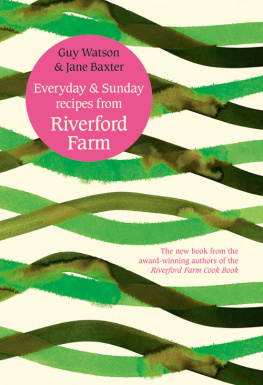

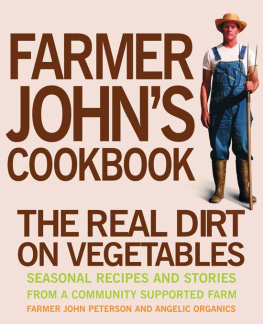

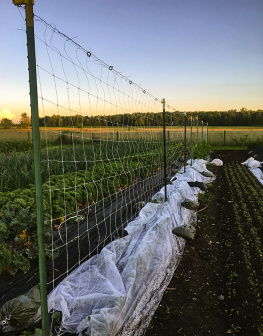
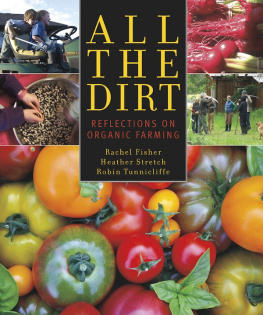
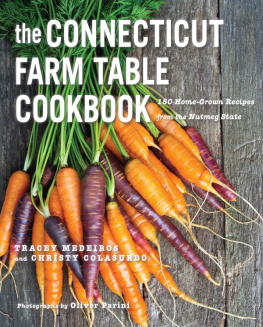
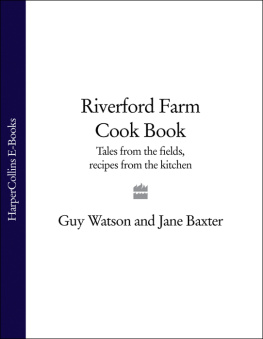
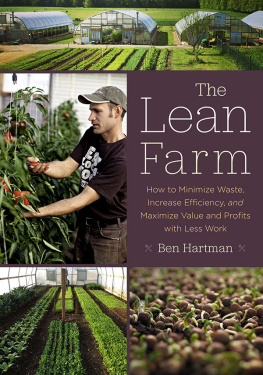
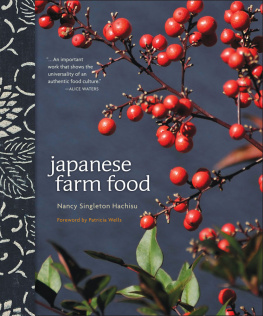
 Contents When Guy Watson began growing vegetables organically on his familys farm in South Devon, it was the beginning of Riverford Organic. They are now one of the countrys largest independent organic growers and pioneering veg box suppliers, regularly garnering critical acclaim for their delivery service and Field Kitchen restaurant. Riverfords awards include the Soil Associations Best Organic Retailer 2009, the Observer Ethical Awards Best Business 2009 and Best Online Retailer 2010, and the Observer Food Monthly s Best Ethical Restaurant 2009 and 2010. Month by month, Everyday & Sunday describes what vegetables are in season and the best ways to use them, with recipes for quick, everyday meals alongside one or two for a more celebratory dish, or an indulgent Sunday feast. From a warming kale gratin in March, to a fresh salad of braised Little Gems and mint in June or a Swiss chard, squash and blue cheese torte in October, Jane Baxters simple and inspiring recipes will help you to make the best of your veg, all year round.
Contents When Guy Watson began growing vegetables organically on his familys farm in South Devon, it was the beginning of Riverford Organic. They are now one of the countrys largest independent organic growers and pioneering veg box suppliers, regularly garnering critical acclaim for their delivery service and Field Kitchen restaurant. Riverfords awards include the Soil Associations Best Organic Retailer 2009, the Observer Ethical Awards Best Business 2009 and Best Online Retailer 2010, and the Observer Food Monthly s Best Ethical Restaurant 2009 and 2010. Month by month, Everyday & Sunday describes what vegetables are in season and the best ways to use them, with recipes for quick, everyday meals alongside one or two for a more celebratory dish, or an indulgent Sunday feast. From a warming kale gratin in March, to a fresh salad of braised Little Gems and mint in June or a Swiss chard, squash and blue cheese torte in October, Jane Baxters simple and inspiring recipes will help you to make the best of your veg, all year round. 
 When, after years of exponential growth, sales of our vegetable boxes quite suddenly plateaued in early 2007, it took a while to figure out why.
When, after years of exponential growth, sales of our vegetable boxes quite suddenly plateaued in early 2007, it took a while to figure out why.